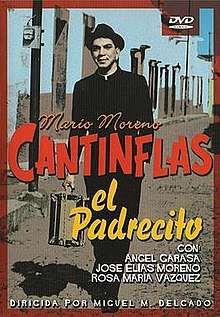El padrecito
El padrecito (English: "The Little Priest") is a 1964 Mexican comedy film directed by Miguel M. Delgado, starring Cantinflas, Ángel Garasa and Rosa María Vázquez.[1]
| El padrecito | |
|---|---|
 DVD cover | |
| Directed by | Miguel M. Delgado |
| Produced by | Jacques Gelman |
| Written by | Mario Amendola Renée Asseo |
| Starring | Cantinflas Ángel Garasa Rosa María Vázquez |
| Music by | Raúl Lavista |
| Cinematography | Luis Cuadrado |
| Distributed by | Columbia Pictures |
Release date |
|
Running time | 124 minutes |
| Language | Spanish |
Plot
The young priest Father Sebastián (played by Cantinflas) is assigned to a parish in San Jerónimo el Alto, where he is not welcomed by the community, particularly the resident priest Father Damián (played by Ángel Garasa). The newcomer gradually earns the trust of the people through humor, but firmly captures their hearts by saving the town fiesta by fighting a bull when the hired torero failed to show.
Father Sebastián counsels the townspeople, lecturing them on their duties in a modern society. He used the collection plate to redistribute the town's wealth more evenly. When accused of communism, he quoted the 1891 socially conscious encyclical Rerum novarum. He even ventured into politics, with a veiled attack on the municipal president couched into a sermon. Eventually, he brokers a deal with the local political boss for some concessions for the poor of his parish.
Cast
- Cantinflas as Padre Sebastián
- Ángel Garasa as Padre Damián
- Rosa María Vázquez as Susana
- José Elías Moreno as Don Silvestre
- Angelines Fernández as Sara
- Rogelio Guerra as Marcos
- Florencio Castelló as Don Nicanor
- Jorge Russek as Matías
- Arturo Castro as Nepomuceno
- Gerardo del Castillo as Womanizer
- Armando Gutiérrez as Municipal President
- José Luis Moreno as Young Man (as Jose L. Moreno Lopez)
- Alfonso Torres as Don Felipe (as Alfonso Torres Macias)
- Mary Montiel as Young Man's Girlfriend
- Alberto Catalá as Druggist
- Elodia Hernández as Village Woman
- Alberto Galán as Padre Juan José Romero
- Cecilia Leger as Village Woman
- René Barrera as Villano
- Queta Carrasco as Neighbor
- Marcelo López Linares (uncredited)
Reception
Critics generally viewed the film as typical of the later Cantinflas films, a moralizing feature slim on originality. However, some found the religious themes indicative of the spirit of Latin American Catholicism. Pope John XXIII called the Second Vatican Council only two years earlier, and Cantinflas seemed to be embracing the reforms it espoused as the remedy for Mexico's poverty.
Some accused Cantinflas of mocking the faith and the priesthood, but he assured his audience that his "message would be only positive, constructive, happy, human, Christian." The Latin American contingent of seminarians in Rome apparently shared his assessment, and wrote him a grateful letter.
Some Cantinflas biographers, however, saw political overtones in the film. The book Filmhistoria claims that in the film Cantinflas implicitly helped Mexico's then-ruling party, the Institutional Revolutionary Party (PRI), stating that when the PRI was "threatened by the growing numbers of impoverished Mexicans", Cantinflas "intervened in the current social debate through his film", noting that, while his character was initially presented "in the reformist spirit of the Second Vatican Council", in the end he "gives his approval to closed-door political machinations, winning concessions from the boss [Don Silvestre] by cutting a deck of cards, rather than by leading the people to liberate themselves."[2] In Looking for Mexico: Modern Visual Culture and National Identity, John Mraz stated that "under the guise of being nonideological", in the film Cantinflas "openly encouraged an antipolitical solution to Mexico's problems, suggesting [...] that entering into politics is a cardinal sin."[3]
References
- García Riera, p. 35
- Filmhistoria, p. 199–200
- Mraz, p. 128
Bibliography
- García Riera, Emilio. Historia documental del cine mexicano: 1964. Ediciones Era, 1969.
- Filmhistoria. Volume 9. Promociones y Publicaciones Universitarias, 1999.
- Mraz, John. Looking for Mexico: Modern Visual Culture and National Identity. Duke University Press, 2009.
External links
- El padrecito on IMDb